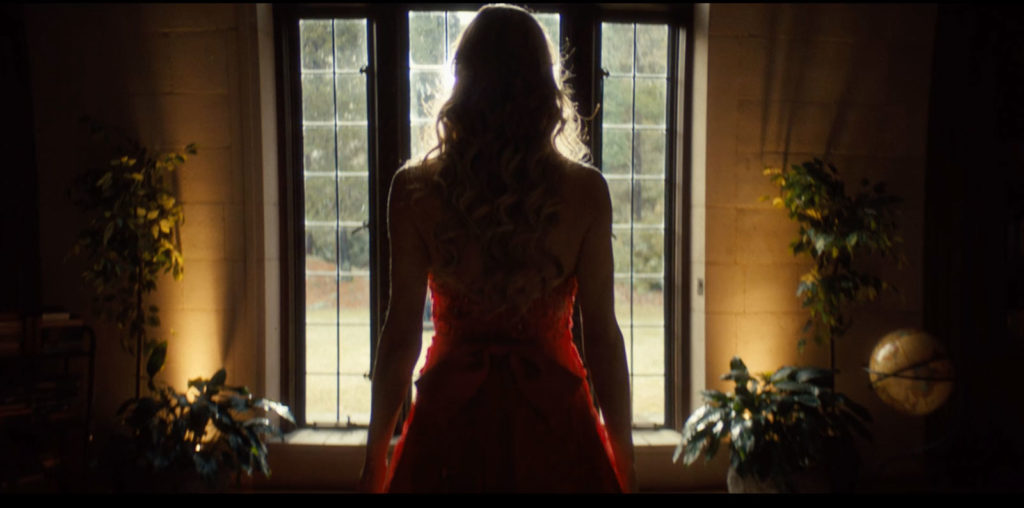
“Crooked Beauty” is an experimental portrait of Jacks Ashley McNamara, an artist and advocate for the mentally ill. Ms. McNamara is an astonishingly articulate person, and in telling her story, she is able to shed an enormous amount of light onto the poorly understood experience of those who have been labeled bipolar. Her story is illustrated throughout by director Ken Paul Rosenthal’s beautifully shot and edited black and white footage, showing a variety of landscapes such as abandoned buildings and time-lapse shots of clouds curling behind railroad trestles. These shots almost always have a direct relationship to McNamara’s narrative.
For example, a shot of weeds growing through cracks illustrates her observation that poetry always involves the struggle to create beauty out of personal pain. When McNamara expounds her idea that a person who has been labeled “mentally ill” can learn to understand and benefit from her different way of experiencing the world, this is illustrated by a visually noisy shot of a lake reflecting light, which slowly cross-fades into the calm image of a bird soaring through an open sky. The relationship between image and narrative is poetic rather than literal. Rosenthal’s imagery uses simple landscape photography to create a visual poem which parallels and enriches McNamara’s description of her inner landscape.
McNamara tells of being raised by an alcoholic mother who was both abusive and extremely negligent. Her memories feel “like they happened underwater, a long time ago.” As a child, her reality was so intolerable that she “wanted to get out of my body and out of my life so badly.” The roots of her problem become obvious when she relates that her worst episode of depression is triggered when she finds out that her mother cannot say the words “I love you.”
Poignantly, when McNamara tells about her first institutionalization at age 19, we no longer hear her voice, telling the story aloud. We also stop hearing Monteith McCollum’s music. Instead, in complete silence, the story continues on inter-titles. She did not find that the mental hospital provided her with the tools or insights she needed. “Being told that I had a ‘mental illness’ was both horrifying, and very conveniently let me off the hook for having responsibility for my life.”
As an 18-year-old having a manic episode, she experiences tremendous intellectual excitement, coupled with emotional impairment. “You can connect 50,000 ideas, but you can’t listen to your friend talk about her relationship.” She characterizes her mental difference from other people as being due to her extreme sensitivity to changes in light, weather, and many other things. She compares her experience to a radio receiving many stations all at the same time, which Rosenthal illustrates with a picture of a utility pole radiating multiple wires. She admits that such extreme sensitivity renders her incapable, without medication, of functioning, for example, as a conventional office worker in a business setting.
As an artist, however, this same sensitivity is the greatest asset imaginable, provided that she develops the delicate skill of reading and understanding her own mental and emotional state so that it doesn’t overwhelm her. Her struggle to learn how to do this is ongoing, and it seems to take every bit of her considerable intelligence, courage, and determination.
McNamara is also an activist. She is a co-founder of the Icarus Project, which has become a large network of people, as she puts it, “learning to navigate the space between brilliance and madness.” In turn, she credits the process of building a community, and learning to trust other people, as the most important component of her work towards regaining mental health.
At the end of the film, we see a couple of examples of McNamara’s visual artwork. These collages blend disparate media, such as photographs, watercolor, and prints, to create compositions with a highly active and dynamic charge to them. It seems clear that she uses her art to re-establish a sense of balance for herself, and for the viewer.
Jacks McNamara is a brilliant speaker and thinker, and I learned more from her insights in this short film than I had from reading any number of books on the subject. Her courage and activism may help to bring about an important paradigm shift in our cultural view of those who are mentally different, and this film is an important part of that effort. Ken Paul Rosenthal, with his gift for translating elusive mental states into powerful, poetic images, helps to bring McNamara’s insights to a wider audience, while also creating a work of filmed illuminated text, where what appears to be crooked reveals its inherent beauty.
